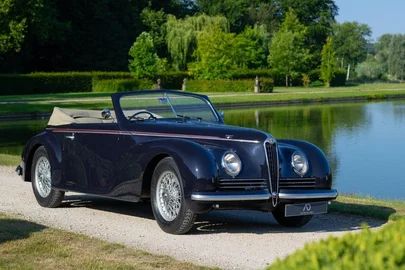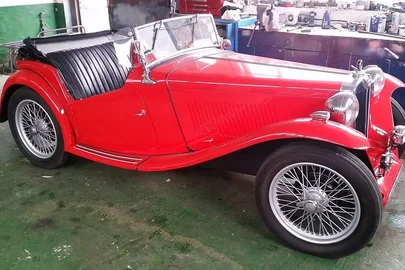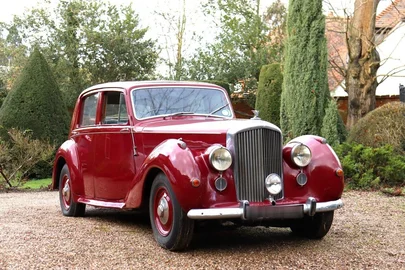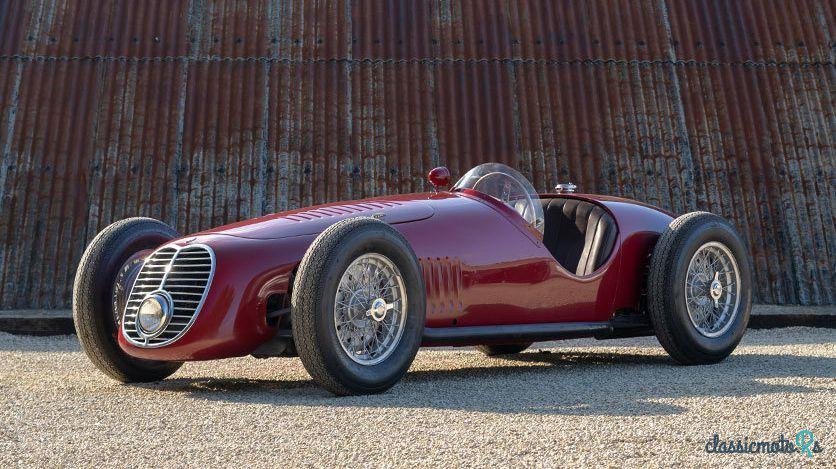

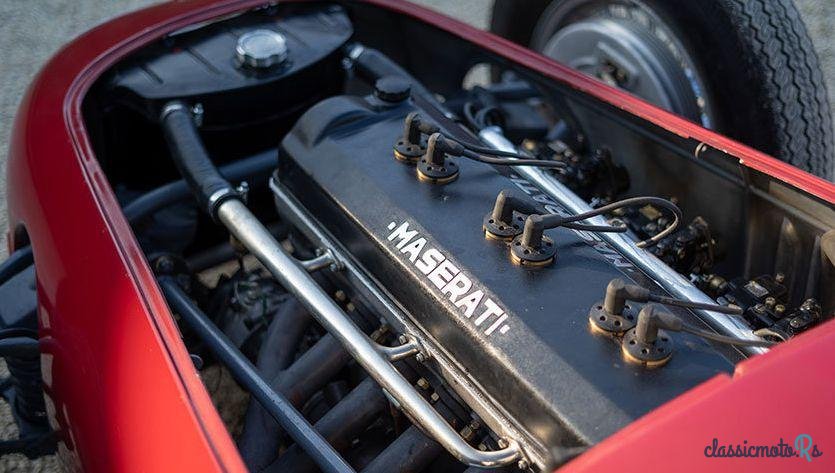
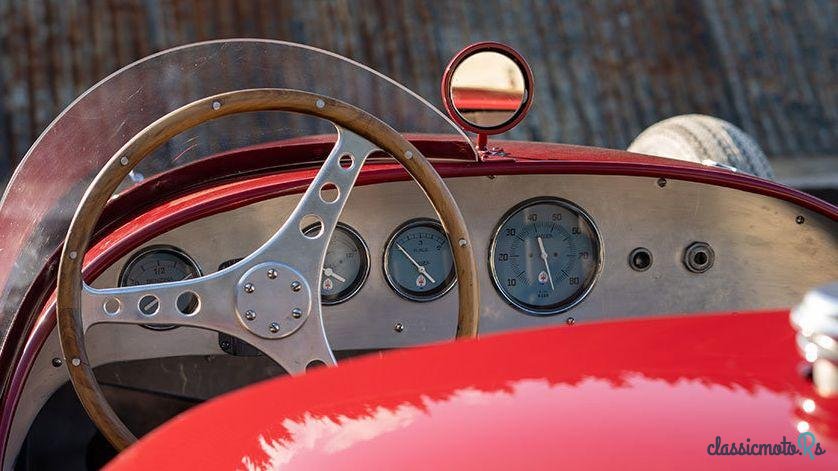

5 фото
1947' Maserati A6Gcs
Пожаловаться!Оценить!Запомнить это
Возможен торгОпубликовано 25 января 2020
Обновлено 25 января 2020ID: mVzIW4
Обновлено 25 января 2020ID: mVzIW4
Истекло
6 лет назад
6 лет назад
Information from the owner
Кузов: Спорткар
Возраст: 73 года
Комментарии продавца про 1947' Maserati A6Gcs
Original engine and gearbox raced by Juan Manuel Fangio
Replica Siluro chassis and body
Period racing history
MODEL HISTORY
The Maserati A6GCS is the last true Maserati. In 1947 the Maserati brothers Ernesto, Bindo and Ettore, now released from their contract with the Orsi family packed up their tools and left to form OSCA with their sights set on building lightweight, fast racing cars. Before they left however, they had time for one last masterpiece, the Maserati A6GCS Series I.
Designed in conjunction with lead technical engineer Alberto Massimo, the car was officially called the 2000 Sport after the powerful 1978cc straight-6 under the bonnet. Styled by Medando Fantuzzi, the Monofaro or single headlight was initially designed to have a coupé body but the Maserati brothers, forever focussed on weight saving instructed Fantuzzi to design a lighter “Siluro” or torpedo body featuring cycle-wing fenders to protect the open wheels during racing.
The Maserati brothers, perhaps aware this was the last car they would design for the company that bore their name, paid particular attention to the development of the Monofaro. The car was a mechanical masterpiece featuring double wishbone suspension across a low-slung tubular frame chassis with the engine mounted to a 4-speed gearbox. The resulting car was a force to be reckoned with, taking the fight to the more powerful Ferraris also racing at the time.
The Monofaro raced predominantly in Formula 2 races where the greats such as Alberto Ascari, Stirling Moss and Tazio Nuvolari battled week in, week out at race meetings all over Europe. The first Monofaro made its debut in 1947 at a Modena sports car race where Ascari and Luigi Villoresi came first and second. In 1948 Maserati Monofaro chassis number 2007 left the Modena factory gates and began its racing career as a works factory car. The car competed on behalf of the Maserati team in European races before being renumbered by the factory in 1949 to chassis 2010 as was a fairly regular occurrence in period. However, by this time the factory had begun development of the A6GCS Series 2 and so sold the car to an Italian businessman named Giuseppe Vianini.
Before WWII Giuseppe Vianini had established a successful business in Argentina as a motorcycle dealer and through his business became involved with AC Argentina Equipe who sponsored promising Argentinian racing drivers to come to Europe. One such driver they sponsored was Juan Manuel Fangio who had proven himself on dirt and gravel long-distance races across South America. These races were far removed from the Grand Prix races held in Europe which were considered the pinnacle of competition racing and so in 1947 Fangio moved to Europe to continue his racing career.
Having seen Fangio race in South America Guiseppe Vianini was eager to get the young Argentinian into his Monofaro and began leveraging his contacts with AC Equipe Europe to get Fangio into his Monofaro. For the 1949 Rome Formula 2 race Fangio lined up in chassis 2010 against the dominant Ferrari 166Cs. In reality the Ferraris were always going to win with double the cylinder count but the Maseratis of Fangio and Benedicto Campos provided the only credible opposition.
For the 1952 season Vianini, eager to get involved with the South American Maserati dealer network imported the A6GCS to Argentina where he sold the car to Carlos Lostaló. Lostaló continued to race chassis 2010 in the local races around Buenos Aires. At some point in the early ‘50s Lostaló removed the engine and gearbox from “2010” and fitted a Ford V8 engine and continued to race the car throughout the 1950s. The original engine and gearbox went into storage.
THIS CAR
The car we offer here is a hand-crafted Maserati A6GCS Monofaro featuring a Siluro body fitted with the original engine and gearbox from chassis 2010, the car driven by 5-time Formula One World champion Juan Manuel Fangio. The engine and gearbox lay in storage for a considerable length of time before being acquired by the car’s current owner who himself stored the drivetrain until recently deciding to commission a replica chassis and body around the original engine.
Since arriving in the UK the car has been prepared by expert historic racing specialists and is now ready to be enjoyed either on the race track or on the road. The car is clearly an important piece of motorsport history and represents a rare opportunity not only to own a car once driven by El Maestro but also to experience the masterpiece that is the last true Maserati.
Available now for immediate inspection in The Hub Hangar Showroom.
Replica Siluro chassis and body
Period racing history
MODEL HISTORY
The Maserati A6GCS is the last true Maserati. In 1947 the Maserati brothers Ernesto, Bindo and Ettore, now released from their contract with the Orsi family packed up their tools and left to form OSCA with their sights set on building lightweight, fast racing cars. Before they left however, they had time for one last masterpiece, the Maserati A6GCS Series I.
Designed in conjunction with lead technical engineer Alberto Massimo, the car was officially called the 2000 Sport after the powerful 1978cc straight-6 under the bonnet. Styled by Medando Fantuzzi, the Monofaro or single headlight was initially designed to have a coupé body but the Maserati brothers, forever focussed on weight saving instructed Fantuzzi to design a lighter “Siluro” or torpedo body featuring cycle-wing fenders to protect the open wheels during racing.
The Maserati brothers, perhaps aware this was the last car they would design for the company that bore their name, paid particular attention to the development of the Monofaro. The car was a mechanical masterpiece featuring double wishbone suspension across a low-slung tubular frame chassis with the engine mounted to a 4-speed gearbox. The resulting car was a force to be reckoned with, taking the fight to the more powerful Ferraris also racing at the time.
The Monofaro raced predominantly in Formula 2 races where the greats such as Alberto Ascari, Stirling Moss and Tazio Nuvolari battled week in, week out at race meetings all over Europe. The first Monofaro made its debut in 1947 at a Modena sports car race where Ascari and Luigi Villoresi came first and second. In 1948 Maserati Monofaro chassis number 2007 left the Modena factory gates and began its racing career as a works factory car. The car competed on behalf of the Maserati team in European races before being renumbered by the factory in 1949 to chassis 2010 as was a fairly regular occurrence in period. However, by this time the factory had begun development of the A6GCS Series 2 and so sold the car to an Italian businessman named Giuseppe Vianini.
Before WWII Giuseppe Vianini had established a successful business in Argentina as a motorcycle dealer and through his business became involved with AC Argentina Equipe who sponsored promising Argentinian racing drivers to come to Europe. One such driver they sponsored was Juan Manuel Fangio who had proven himself on dirt and gravel long-distance races across South America. These races were far removed from the Grand Prix races held in Europe which were considered the pinnacle of competition racing and so in 1947 Fangio moved to Europe to continue his racing career.
Having seen Fangio race in South America Guiseppe Vianini was eager to get the young Argentinian into his Monofaro and began leveraging his contacts with AC Equipe Europe to get Fangio into his Monofaro. For the 1949 Rome Formula 2 race Fangio lined up in chassis 2010 against the dominant Ferrari 166Cs. In reality the Ferraris were always going to win with double the cylinder count but the Maseratis of Fangio and Benedicto Campos provided the only credible opposition.
For the 1952 season Vianini, eager to get involved with the South American Maserati dealer network imported the A6GCS to Argentina where he sold the car to Carlos Lostaló. Lostaló continued to race chassis 2010 in the local races around Buenos Aires. At some point in the early ‘50s Lostaló removed the engine and gearbox from “2010” and fitted a Ford V8 engine and continued to race the car throughout the 1950s. The original engine and gearbox went into storage.
THIS CAR
The car we offer here is a hand-crafted Maserati A6GCS Monofaro featuring a Siluro body fitted with the original engine and gearbox from chassis 2010, the car driven by 5-time Formula One World champion Juan Manuel Fangio. The engine and gearbox lay in storage for a considerable length of time before being acquired by the car’s current owner who himself stored the drivetrain until recently deciding to commission a replica chassis and body around the original engine.
Since arriving in the UK the car has been prepared by expert historic racing specialists and is now ready to be enjoyed either on the race track or on the road. The car is clearly an important piece of motorsport history and represents a rare opportunity not only to own a car once driven by El Maestro but also to experience the masterpiece that is the last true Maserati.
Available now for immediate inspection in The Hub Hangar Showroom.
